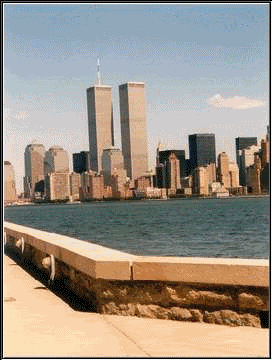


Posted on 02/24/2006 4:56:54 AM PST by indcons
WASHINGTON, Feb. 24 (UPI) -- A United Arab Emirates government-owned company is poised to take over port terminal operations in 21 American ports, far more than the six widely reported.
The Bush administration has approved the takeover of British-owned Peninsular & Oriental Steam Navigation Co. to DP World, a deal set to go forward March 2 unless Congress intervenes.
P&O is the parent company of P&O Ports North America, which leases terminals for the import and export and loading and unloading and security of cargo in 21 ports, 11 on the East Coast, ranging from Portland, Maine to Miami, Florida, and 10 on the Gulf Coast, from Gulfport, Miss., to Corpus Christi, Texas, according to the company's Web site.
President George W. Bush on Tuesday threatened to veto any legislation designed to stall the handover.
Sen. Hillary Clinton, D-N.Y. said after the briefing she expects swift, bi-partisan approval for a bill to require a national security review before it is allowed to go forward.
At issue is a 1992 amendment to a law that requires a 45-day review if the foreign takeover of a U.S. company "could affect national security." Many members of Congress see that review as mandatory in this case.
But Bush administration officials said Thursday that review is only triggered if a Cabinet official expresses a national security concern during an interagency review of a proposed takeover.
"We have a difference of opinion on the interpretation of your amendment," said Treasury Department Deputy Secretary Robert Kimmitt.
The Committee on Foreign Investment in the United States, comprised of officials from 12 government departments and agencies, including the National Security Council and the Department of Homeland Security, approved the deal unanimously on January 17.
"The structure of the deal led us to believe there were no national security concerns," said Homeland Security Deputy Secretary Michael P. Jackson.
The same day, the White House appointed a DP World executive, David C. Sanborn, to be the administrator for the Maritime Administration of the Department of Transportation. Sanborn had been serving as director of operations for Europe and Latin America at DP World.
Senate Armed Services Committee Chairman John Warner, R- Va., said he will request from both the U.S. attorney general and the Senate committee's legal counsel a finding on the administration's interpretation of the 1992 amendment.
Adding to the controversy is the fact Congress was not notified of the deal. Kimmitt said Congress is periodically updated on completed CFIUS decisions, but is proscribed from initiating contact with Congress about pending deals. It may respond to congressional inquiries on those cases only.
Iowa Republican Sen. Charles Grassley stated in a letter to Bush on Feb. 21 that he specifically requested to be kept abreast of foreign investments that may have national security implications. He made the request in the wake of a controversial Chinese proposal to purchase an oil company last year.
"Obviously, my request fell on deaf ears. I am disappointed that I was neither briefed nor informed of this sale prior to its approval. Instead, I read about it in the media," he wrote.
According to Kimmitt, the deal was reported on in major newspapers as early as last October. But it did not get critical attention in the press until the Associated Press broke the story Feb. 11 and the Center for Security Policy, a right-leaning organization, wrote about it Feb. 13. CSP posited the sale as the Treasury Department putting commerce interests above national security.
Kimmitt said because the 2005 Chinese proposal had caused such an uproar before it ever got to CFIUS, the lack of reaction to the Dubai deal when it was reported on last fall suggested it would not be controversial enough to require special notification of Congress.
Central to the debate is the fact that the United Arab Emirates, while a key ally of the United States in the Middle East, has had troubling ties to terrorist networks, according to the Sept. 11 Commission report. It was one of the few countries in the world that recognized the al-Qaida-friendly Taliban government in Afghanistan; al-Qaida funneled millions of dollars through the U.A.E. financial sector; and A.Q. Khan, the notorious Pakistani nuclear technology smuggler, used warehouses near the Dubai port as a key transit point for many of his shipments.
Since the terrorist attacks, it has cut ties with the Taliban, frozen just over $1 million in alleged terrorist funding, and given the United States key military basing and over-flight rights. At any given time, there are 77,000 U.S. service members on leave in the United Arab Emirates, according to the Pentagon.
Deputy Defense Secretary Gordon England warned that the uproar about the United Arab Emirates involvement in U.S. ports could risk alienating the very countries in the Middle East the United States is trying to court as allies in the war on terrorism.
"It's very important we strengthen bonds ... especially with friends and allies in the Arab world. It's important that we treat friends and allies equally around the world without discrimination," he said.
The security of port terminal operations is a key concern. More than 7 million cargo containers come through 361 American ports annually, half of the containers through New York-New Jersey, Los Angeles and Long Beach, Calif. Only a small percentage are physically searched and just 37 percent currently screened for radiation, an indication of an attempt to smuggle in nuclear material that could be used for a "dirty bomb."
After the September 11 terrorist attacks, the government began a new program that required documentation on all cargo 24 hours before it was loaded on a ship in a foreign port bound for the United States. A "risk analysis" is conducted on every shipment, including a review of the ship's history, the cargo's history and contents and other factors. Each ship must also provide the U.S. government 96 hours notice of its arrival in an American port, along with a crew manifest.
None of the nine administration officials assembled for the briefing could immediately say how many of the more than 3,000 port terminals are currently under foreign control.
Port facility operators have a major security responsibility, and one that could be exploited by terrorists if they infiltrate the company, said Joe Muldoon III. Muldoon is an attorney representing Eller & Co., a port facility operator in Florida partnered with M&O in Miami. Eller opposes the Dubai takeover for security reasons.
"The Coast Guard oversees security, and they have the authority to inspect containers if they want and they can look at manifests, but they are really dependent on facility operators to carry out security issues," Muldoon said.
The Marine Transportation Security Act of 2002 requires vessels and port facilities to conduct vulnerability assessments and develop security plans including passenger, vehicle and baggage screening procedures; security patrols; establishing restricted areas; personnel identification procedures; access control measures; and/or installation of surveillance equipment.
Under the same law, port facility operators may have access to Coast Guard security incident response plans -- that is, they would know how the Coast Guard plans to counter and respond to terrorist attacks.
"The concern is that the UAE may be our friend now ... but who's to say that couldn't change, or they couldn't be infiltrated. Iran was our big buddy," said Muldoon.
In a January report, the Council on Foreign Relations pointed out the vulnerability of the shipping security system to terrorist exploitation.
Since the Sept. 11 terrorist attacks, the U.S. customs agency requires shippers to follow supply chain security practices. Provided there are no apparent deviations from those practices or intelligence warnings, the shipment is judged low risk and is therefore unlikely to be inspected.
CFR suggests a terrorist event is likely to be a one-time operation on a trusted carrier "precisely because they can count on these shipments entering the U.S. with negligible or no inspection."
"All a terrorist organization needs to do is find a single weak link within a 'trusted' shipper's complex supply chain, such as a poorly paid truck driver taking a container from a remote factory to a port. They can then gain access to the container in one of the half-dozen ways well known to experienced smugglers," CFR wrote.
Heck, we have a popular shopping mall in the area that is 90% owned by the UAE. Nobody seems to care about that. Does the general public know that the CITGO stations in their neighborhood are owned by a foreign country (Venezuela/Chavez)?
The only problem I now have is that those defending the takeover deal have made some good points about the UAE but they are also neglecting to tell the whole story. For instance, I heard Rush say on the radio that, in regards to the UAE and their relationship with the U.S., the UAE even donated $100 million dollars to the Katrina relief fund. Terrific! That's a good sign, right?
But wait.... Rush forgot to mention that the donation was made just a few short weeks ago. It doesn't take Ben Matlock to figure this "donation" out.
What is with this trend we are seeing here in Free Republic?
There are a few who think that if a person doesn't agree 100% with the Administration, that person is accused of being unpatriotic, is stupid, is a troll, is a cry-baby, blah, blah, blah.
This is a dangerous trend, in my opinion. It is not conducive to intelligent debate.
Debate is a very useful tool; one which must be present in a free society.
Comments?
Yeah, I know. Terrorists won't target the ports.
I can ask the same question about the Longshoreman that will actually be doing the loading and unloading. Thanks to thier union they have that power over us at every single terminal at every single port.
You do realize that outside of management in the home office in Dubai, that every single employee at the actual ports will be an American right? You do know that DPO COO is an american don't you? You also know that out of thier entire Board of Directors, exactly ONE person is from the UAE (albeit he is the CEO), every other board member is American, British, Dutch or Indian.
This is an international company, it is not a bunch of Arabs that will be suddenly running around our Ports. DPO runs Terminals at ports all over the world. They have not been tied to one single terrorist network or incident in thier entire exsistance.
The UAE even allows us to Station DHS and Customs agents AT THEIR HOME PORTS to inspect cargo and manifests. They did this voluntarily after a story a couple years ago that UAE ports might have been a transit point for scientific equipment going to Libya I think.
Until Bill Clinton got in power, ocean and fresh water ports were considered sensitive and protected for NATIONAL security. Since Bill Clinton and the "free traitin'" globalists of the the Bush administrations have been "reinventing our government" we have lost our ability to protect our vital interests to the international corporations favored by the globalists.
The COO is an American? Where do you think his allegiance lies?
Thank the Lord there was no FR when Reagan was in office!
You have FReepmail
Actually, nobody disputes that the law applies in this case. Even the merger agreement specifically includes dependencies on getting through this review.
The argument by congress NOW that all the facts are out has been whittled down to simply whether or not a 45-day formal review is REQUIRED, or if the reviewing agency is only AUTHORISED to do a 45-day review, but not REQUIRED to do one.
The procedures FOR the group have ALWAYS been to evaluate a sale, and only have a formal review if one of the participants finds an objection or a concern. That was true for many mergers and aquisitions evaluated during the Clinton administration (which may be why Bill isn't talking).
It may well be that a court would find the 45-day review is mandatory. I'm not a lawyer. But if it is, it wasn't Bush's fault they didn't do it, he isn't even allowed by the law to be a part of the process until after the reviews are completed.
I'm also wondering if the reason it was so easy for the government to approve this deal is because they have already have several reviews of this company.
For example, they must have closely evaluated this company when they were signing trade agreements a couple of years ago to enhance security of shipping containers (we require U.S. personell access to containers in foreign ports, and UAE was the first to sign these agreements).
We also must have evaluated UAE when putting together the agreements to have them service our military ships in their ports.
And, the same law must have been triggered in last year's sale of CSX's foreign port operations to DP World.
The democrats who last week said this deal was OBVIOUSLY wrong are now simply saying they want a full 45-day review just to make sure we can solve any little issues amicably. They seem "shocked" that no agency found anything bad-looking about this. But I think they just didn't think about the fact that this would not have been the first time an evaluation would have been done on this company.
Or that we have been closely monitoring UAE since 9/11 as part of the cooperation we are getting from them.
Darnit! Don't inject facts into this converstation, you are only trying to divert our attention fromm our self-righteousness! Typical tactic for the common sense pragamatist who are threatening our ignorance...
Slight correction: They will complete the purchase of P&O, but have PROMISED not to take any actions regarding the U.S. ports for now while the details are worked out.
They certainly don't expect a further review to change things.
They won't change but it would be funny if it did...that would leave them with Singapore and own background issues with the contract.
One nuke, one container, one ship, one warehouse, on an out-of-the-way wharf.
How much do you need?
- John
ping
Iran WAS one of our best allies. Then some well-meaning people in government like Jimmy Carter decided we should punish our friend because frankly he did a LOT of bad things, and he wasn't really nice to his people, and he had tied to shady organizations -- all the things we here now about UAE.
So Carter cut down the Shah, and the Ayatollah took advantage and staged a coup. And a country that was one of our best allies in the region turned almost overnight into our biggest enemy, as they took over our embassy.
Now almost 30 years later they are the single biggest threat to our way of life in the world today.
Lesson: Don't unnecessarily antagonize and undercut your friends, you might not like the alternative.
This of course is NOT the lesson the opponents of this sale wanted us to get from bringing up Iran.
On the larger picture -- every country is a potential enemy, and a potential ally. Nobody can say which will be which in 30 years. The law doesn't even ALLOW us to do that in this case, we have to evaluate based on ACTUAL threats, not threats that may or may not exist in the future.
THank You, Now we get to the gist of your argument, and I cannot fault you whatsoever for that position. However, you framed your argument earlier in the context of us allowing Arab's to run our ports, when your real beef is with the policies that allow any foreign entity access to our ports.
In that vein, I say god speed, and count me along for the ride in any attempts to get these policies tightened or changed
However, in the case at hand, everything has been done according to the rules in place now, and DPO has been found trustworthy.
I should point out that the number 6 came from all sources in opposition to this deal. I don't think the administration ever said anything like "hey, it's only 6 ports", although I've read that here.
It is "interesting" that the number is 21, but I imagine the others aren't as comprehensive as the 6 -- there must be some reason why those 6 stood out for the opponents to harp on that number for so long.
This also once again points out that there are american companies running these ports -- they are simply subsidiaries of foreign companies. And after the deal, the same american companies will run the ports, reporting to the same people in the foreign company -- it's just that now THAT company's board will be reporting up to the board of a different company.
Disclaimer: Opinions posted on Free Republic are those of the individual posters and do not necessarily represent the opinion of Free Republic or its management. All materials posted herein are protected by copyright law and the exemption for fair use of copyrighted works.